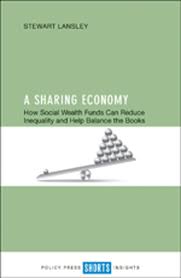In A Sharing Economy: How Social Wealth Funds can Reduce Inequality and Help Balance the Books, Stewart Lansley offers a timely proposal for a significant shift in the relations between capital, citizens and the state to combat inequality and to ensure a more just distribution of wealth. This is a concise and informative book that will be of interest to anyone interested in building a fairer economic model, writes Erica Frazier.
A Sharing Economy: How Social Wealth Funds can Reduce Inequality and Help Balance the Books. Stewart Lansley. Policy Press Shorts. 2016.
CEOs in the United Kingdom earn more than 180 times the wages of an average employee. In the six years following the worst economic recession in recent memory, the world’s top 100 companies almost doubled their market value to $16.2 trillion. These are the signs of a modern economy which not only encourages but is founded on socioeconomic inequality. Stewart Lansley’s book, A Sharing Economy: How Social Wealth Funds can Reduce Inequality and Help Balance the Books, is a timely exploration of the means of mounting a significant shift in the relations between capital, citizens and the state to improve the current capitalist model of political economy.
Lansley’s latest book proposes a number of ideas which, if implemented, would not only decrease the current, ever-worsening levels of socioeconomic inequality, but also ensure a more just distribution of national wealth for future generations. These ideas could also encourage greater democratic control over the sources of this wealth at a time when growing numbers of individuals feel as though they are being left behind. As Lansley explains in a short overview of his book on the LSE British Politics and Policy blog, his plan aims at ‘attacking the roots of inequality.’
Lansley himself has authored or co-authored several books exposing and challenging socioeconomic inequality, bringing a well-defined perspective to his latest work. A Sharing Economy is short enough to be finished over a weekend, and is written in an accessible style, making it a nice entry point for anyone interested in exploring options for creating a more equitable economy. Key ideas and statistics are frequently presented with clear subheadings, tables or bullet-point lists. Additionally, the book includes a helpful index which makes it easy for readers to find quotes from key economic institutions and political figures or compare data from the book’s selected case studies. The book is also reader-friendly in that each chapter could easily stand on its own in offering informative examples and posing key questions for debate regarding the future structure of the political economy.
 Image Credit: (OuiShare CC BY SA 2.0)
Image Credit: (OuiShare CC BY SA 2.0)
It is important to emphasise that Lansley’s arguments are not levelled against capitalism itself, but rather the inequalities fostered by ‘corporate capitalism’. Lansley has taken pains to craft a thoughtful series of arguments which could appeal to most currents in mainstream economics, presenting statements in favour of these plans from both neo-classical and neo-liberal thinkers as well as from those left of centre. Quotes from Adam Smith and Friedrich von Hayek appear alongside those from trade union leaders in a way which builds a ‘common sense’ case in favour of a new ‘sharing economy’. Socioeconomic data and statistics are impressively up-to-date. Real-world case studies from a range of countries and recent decades are presented and compared with the socioeconomic needs and political context of the modern-day UK. The book covers a logical progression of relevant topics, outlining the concepts of social wealth funds and citizen’s payments as well as the means for diluting the concentration of capital.
In the ‘Preface’, Lansley describes social wealth funds as publicly owned financial tools meant to serve the greater social good. These would be established by pooling public assets and managed so as to accrue value over the long-term, rather than perpetuating the financial short-termism and one-off sales of which many governments are guilty. These funds are at the heart of the book and are developed in great detail in Chapter Five through the discussion of four possible forms which a social wealth fund could take. Lansley also outlines some of the different potential structures for the boards of management of such funds, though he is careful to highlight the importance of establishing a code for ethical investments, and of ensuring independence and transparency in the board’s decision-making.
Ideas for diluting ownership and creating citizen’s payments are advanced in Chapter Six. Citizen payments are dividends which could be provided to all citizens from a portion of the social wealth fund’s revenues. (Lansley describes the possibility of converting this into a full income supplement or basic income in Chapter Seven.) The book also describes the possibility of using hypothecated taxes on given corporate activities, financial transactions or the inheritance or ownership of capital to both finance the social wealth fund and combat the growing wealth gap. One of the most intriguing proposals, however, is the idea of requiring publicly traded companies to regularly issue new shares to the social wealth fund. At a time where more than half the shares of UK-based companies are held abroad, such an idea could not only reduce private capital holdings, but could also reintroduce national public influence over key elements of the economy.
Despite the compelling descriptions of the different ways to build a new sharing economy, Lansley points out that much remains to be debated, and that these ideas should be adapted to specific contexts and goals, even levels of government—from local to regional and national—and used along with other measures to create a more inclusive economy. Lansley also acknowledges the importance of winning broad public support for these ideas, arguing that the notion of more fairly distributing wealth has the potential to gain significant popular favour. With increasing pressures on the working class, poor and working poor, as well as the recent successes of populist platforms, this seems like a reasonable assertion.
There does seem to be one significant area of discussion which is not given as much attention as it would seem to merit in Lansley’s vision of a ‘sharing economy’. Most of the real-world examples of social wealth funds are based on mineral extraction and the sale of fossil fuels. Though Lansley does acknowledge lingering questions concerning the returns on such activities in the wake of plummeting oil prices, he dedicates just one fleeting sentence to the critiques of such exploitation. The impacts of mining, fracking, drilling and other activities can be devastating for entire ecosystems, and current scientific consensus indicates that fossil fuels cannot be exploited much longer if we are to maintain a planet capable of supporting life. However, this gap in the discussion does not detract from the book’s central arguments, but rather draws attention to the need for further research and debate to identify additional, environmentally sound sources of funding. Connecting Lansley’s ideas to a post-Brexit economy is another promising path for future work.
Overall, A Sharing Economy is a concise, reader-friendly argument for building a fairer economy. It draws upon a range of the latest data and statistics and a series of relevant case studies to advance proposals which could build consensus across political parties and among the general public. Lansley has created an informative book accessible to anyone interested in rethinking the current model of political economy.
Erica Frazier is a doctoral student pursuing a joint PhD in political science under the direction of Prof. John Barry at Queen’s University Belfast in Northern Ireland and Prof. Karin Fischer with the REMELICE laboratory at the Université d’Orléans, France. Her current research interests include political economy, green and labour politics and political discourses, cultures and movements in the United Kingdom and Ireland. Read more by Erica Frazier.
Note: This review gives the views of the author, and not the position of the LSE Review of Books blog, or of the London School of Economics.


 Find this book:
Find this book: 





1 Comments